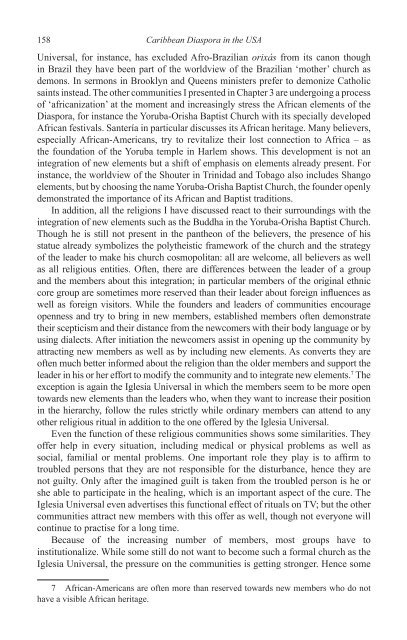You also want an ePaper? Increase the reach of your titles
YUMPU automatically turns print PDFs into web optimized ePapers that Google loves.
158<br />
<strong>Caribbean</strong> <strong>Diaspora</strong> <strong>in</strong> <strong>the</strong> <strong>USA</strong><br />
Universal, for <strong>in</strong>stance, has excluded Afro-Brazilian orixás from its canon though<br />
<strong>in</strong> Brazil <strong>the</strong>y have been part <strong>of</strong> <strong>the</strong> worldview <strong>of</strong> <strong>the</strong> Brazilian ‘mo<strong>the</strong>r’ church as<br />
demons. In sermons <strong>in</strong> Brooklyn and Queens m<strong>in</strong>isters prefer to demonize Catholic<br />
sa<strong>in</strong>ts <strong>in</strong>stead. The o<strong>the</strong>r communities I presented <strong>in</strong> Chapter 3 are undergo<strong>in</strong>g a process<br />
<strong>of</strong> ‘africanization’ at <strong>the</strong> moment and <strong>in</strong>creas<strong>in</strong>gly stress <strong>the</strong> African elements <strong>of</strong> <strong>the</strong><br />
<strong>Diaspora</strong>, for <strong>in</strong>stance <strong>the</strong> Yoruba-Orisha Baptist Church with its specially developed<br />
African festivals. Santería <strong>in</strong> particular discusses its African heritage. Many believers,<br />
especially African-Americans, try to revitalize <strong>the</strong>ir lost connection to Africa – as<br />
<strong>the</strong> foundation <strong>of</strong> <strong>the</strong> Yoruba temple <strong>in</strong> Harlem shows. This development is not an<br />
<strong>in</strong>tegration <strong>of</strong> new elements but a shift <strong>of</strong> emphasis on elements already present. For<br />
<strong>in</strong>stance, <strong>the</strong> worldview <strong>of</strong> <strong>the</strong> Shouter <strong>in</strong> Tr<strong>in</strong>idad and Tobago also <strong>in</strong>cludes Shango<br />
elements, but by choos<strong>in</strong>g <strong>the</strong> name Yoruba-Orisha Baptist Church, <strong>the</strong> founder openly<br />
demonstrated <strong>the</strong> importance <strong>of</strong> its African and Baptist traditions.<br />
In addition, all <strong>the</strong> religions I have discussed react to <strong>the</strong>ir surround<strong>in</strong>gs with <strong>the</strong><br />
<strong>in</strong>tegration <strong>of</strong> new elements such as <strong>the</strong> Buddha <strong>in</strong> <strong>the</strong> Yoruba-Orisha Baptist Church.<br />
Though he is still not present <strong>in</strong> <strong>the</strong> pan<strong>the</strong>on <strong>of</strong> <strong>the</strong> believers, <strong>the</strong> presence <strong>of</strong> his<br />
statue already symbolizes <strong>the</strong> poly<strong>the</strong>istic framework <strong>of</strong> <strong>the</strong> church and <strong>the</strong> strategy<br />
<strong>of</strong> <strong>the</strong> leader to make his church cosmopolitan: all are welcome, all believers as well<br />
as all religious entities. Often, <strong>the</strong>re are differences between <strong>the</strong> leader <strong>of</strong> a group<br />
and <strong>the</strong> members about this <strong>in</strong>tegration; <strong>in</strong> particular members <strong>of</strong> <strong>the</strong> orig<strong>in</strong>al ethnic<br />
core group are sometimes more reserved than <strong>the</strong>ir leader about foreign <strong>in</strong>fluences as<br />
well as foreign visitors. While <strong>the</strong> founders and leaders <strong>of</strong> communities encourage<br />
openness and try to br<strong>in</strong>g <strong>in</strong> new members, established members <strong>of</strong>ten demonstrate<br />
<strong>the</strong>ir scepticism and <strong>the</strong>ir distance from <strong>the</strong> newcomers with <strong>the</strong>ir body language or by<br />
us<strong>in</strong>g dialects. After <strong>in</strong>itiation <strong>the</strong> newcomers assist <strong>in</strong> open<strong>in</strong>g up <strong>the</strong> community by<br />
attract<strong>in</strong>g new members as well as by <strong>in</strong>clud<strong>in</strong>g new elements. As converts <strong>the</strong>y are<br />
<strong>of</strong>ten much better <strong>in</strong>formed about <strong>the</strong> religion than <strong>the</strong> older members and support <strong>the</strong><br />
leader <strong>in</strong> his or her effort to modify <strong>the</strong> community and to <strong>in</strong>tegrate new elements. 7 The<br />
exception is aga<strong>in</strong> <strong>the</strong> Iglesia Universal <strong>in</strong> which <strong>the</strong> members seem to be more open<br />
towards new elements than <strong>the</strong> leaders who, when <strong>the</strong>y want to <strong>in</strong>crease <strong>the</strong>ir position<br />
<strong>in</strong> <strong>the</strong> hierarchy, follow <strong>the</strong> rules strictly while ord<strong>in</strong>ary members can attend to any<br />
o<strong>the</strong>r religious ritual <strong>in</strong> addition to <strong>the</strong> one <strong>of</strong>fered by <strong>the</strong> Iglesia Universal.<br />
Even <strong>the</strong> function <strong>of</strong> <strong>the</strong>se religious communities shows some similarities. They<br />
<strong>of</strong>fer help <strong>in</strong> every situation, <strong>in</strong>clud<strong>in</strong>g medical or physical problems as well as<br />
social, familial or mental problems. One important role <strong>the</strong>y play is to affirm to<br />
troubled persons that <strong>the</strong>y are not responsible for <strong>the</strong> disturbance, hence <strong>the</strong>y are<br />
not guilty. Only after <strong>the</strong> imag<strong>in</strong>ed guilt is taken from <strong>the</strong> troubled person is he or<br />
she able to participate <strong>in</strong> <strong>the</strong> heal<strong>in</strong>g, which is an important aspect <strong>of</strong> <strong>the</strong> cure. The<br />
Iglesia Universal even advertises this functional effect <strong>of</strong> rituals on TV; but <strong>the</strong> o<strong>the</strong>r<br />
communities attract new members with this <strong>of</strong>fer as well, though not everyone will<br />
cont<strong>in</strong>ue to practise for a long time.<br />
Because <strong>of</strong> <strong>the</strong> <strong>in</strong>creas<strong>in</strong>g number <strong>of</strong> members, most groups have to<br />
<strong>in</strong>stitutionalize. While some still do not want to become such a formal church as <strong>the</strong><br />
Iglesia Universal, <strong>the</strong> pressure on <strong>the</strong> communities is gett<strong>in</strong>g stronger. Hence some<br />
7 African-Americans are <strong>of</strong>ten more than reserved towards new members who do not<br />
have a visible African heritage.


















